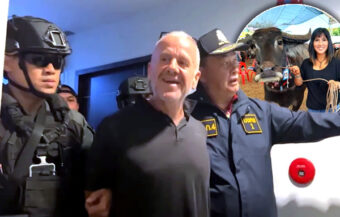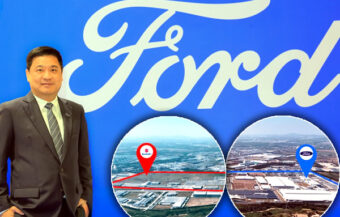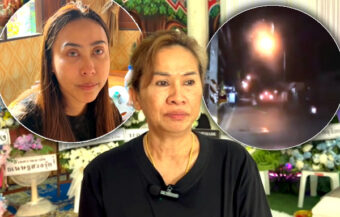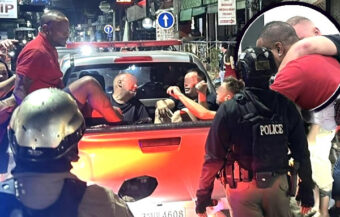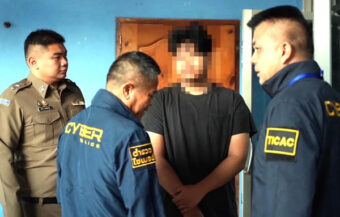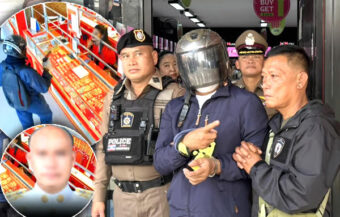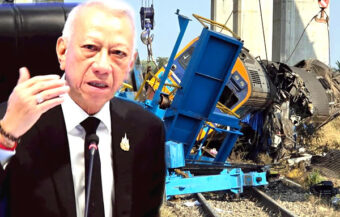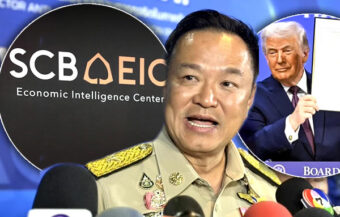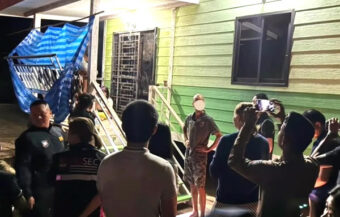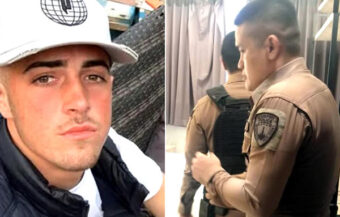A ฿500M meth bust in Loei lays bare Thailand’s deepening border crisis. With drugs flooding in from Myanmar’s Wa State, Thaksin warns it’s time to act. As the Wa’s narco-empire thrives unchecked, Thai officials face mounting pressure to hit back hard.
A dramatic arrest took place late Saturday night in the mountainous Loei province of northeast Thailand. Authorities intercepted a drug haul valued at ฿500 million and apprehended three suspects. The seized narcotics were, as expected, methamphetamine pills smuggled across the border from the notorious Golden Triangle. It marked yet another success for Thai police and security agencies in their relentless—and often unwinnable—battle against drug producers operating across the northern border in Myanmar’s Shan State. The bust came just days after former Thai Prime Minister Thaksin Shinawatra raised the prospect of unilateral action by the Thai government. Significantly, his suggestion prompted a swift clarification from loyal stalwart Deputy Prime Minister Phumtham Wechayachai, currently serving as the Minister of Defence. Nonetheless, Thaksin’s remarks struck a chord—a truth that is becoming increasingly difficult to ignore.
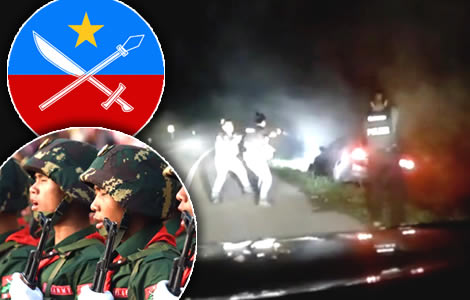
An accident of history — or a long chain of them — has placed a narco-state on Thailand’s northern frontier. Nestled just across the Mekong, in Myanmar’s Wa State, is a drug empire that Thai officials say can no longer be ignored.
Last week, former Prime Minister Thaksin Shinawatra made that message clear. Speaking at an Office of the Narcotics Control Board (ONCB) event, he warned of rising instability across Thailand’s northern border. “We may soon have to act,” he said bluntly.
His words found support. Senior ministers and National Police Commissioner General Kittirat Phanphet were among those who listened to the remarks. Yet Deputy Prime Minister Phumtham Wechayachai quickly clarified that Thaksin’s view was not official policy.
The Wa State narco-empire is a growing crisis Thailand can no longer ignore along its northern border
Still, Thaksin was not speculating. He was describing a crisis in plain sight.
The Wa State, largely under Chinese control, no longer answers to the collapsing Myanmar junta. The military regime in Naypyidaw is rapidly losing ground in a civil war it no longer controls.
As that war drags on, its lawless frontier has become the epicentre of Southeast Asia’s methamphetamine industry.
The United Nations Office on Drugs and Crime (UNODC), regionally headquartered in Bangkok, issued a stark report on 28 May. It identified the Golden Triangle — and especially Wa State — as the region’s leading meth production hub.
The scale is staggering. According to the UN, over one billion methamphetamine pills are produced there annually. That’s 85% of the entire regional supply.
These drugs are flooding into Thailand.
Every week, Thai police intercept massive shipments. But despite historic busts and arrests, the street price remains low. That means supply is still strong — and unrelenting.
Methamphetamine production in the Wa State supplies 85 percent of Southeast Asia’s drugs flooding Thailand
Meanwhile, meth is destroying Thai communities. It fuels violence, theft and social disintegration.
There is no end in sight. This weekend, Border Patrol Police scored another major win.
Late on Saturday night, officers tracked a suspicious sedan through the mountainous roads of Loei Province. The car was heavily loaded. When flagged down, the driver hit the gas.
The car sped down the Pak Chom–Chiang Klom Road. Officers deployed stop sticks. Three tyres blew. The vehicle lost control and skidded off the road. Inside, police found 12 sacks of crystal meth — 504 kg in total.
Three suspects were arrested on the spot: Methinee Yoolek, 26; Adisak Kongkham Sat, 27, from Bang Phli, Samut Prakan; and Pawinun Ngamsri, 26, from Mueang District, Surin. A black Chevrolet pickup truck, believed to be part of the operation, was seized later at a nearby resort.
Police said the group had planned to move the drugs south to Phra Nakhon Si Ayutthaya Province. The suspects claimed it was their first time. They also said they were hired for ฿50,000 to transport the meth, picked up from a point near the Mekong.
Border Patrol Police in Loei seize 504 kilograms of crystal meth in a high-speed chase bust on mountainous roads
Police didn’t believe them. The bust was announced at a press conference held by Loei Governor Chaiphachon Charoonpong, Border Patrol Division 24 Commander Pol. Col. Korn Chaiyasue, and other officials in Chiang Khan District.
They displayed the seized drugs, valued at over ฿500 million.
For Thai authorities, it was another reminder that the border war is not theoretical. It is being fought right now. The mastermind behind much of this trade lies just across the river.
The United Wa State Army (UWSA) operates with near-total autonomy in Myanmar’s Shan State. Its power is rooted in drugs — first heroin, now meth. Without these drugs, the Wa say they wouldn’t exist.
“Without heroin and methamphetamine, the state would not exist,” one Wa leader once said. “The Wa people would be just another indigenous group crushed by the Burmese military.”
Author and journalist Patrick Winn, who has written extensively on the region, puts it bluntly. Drugs, he argues, are not just profit tools. They are survival tools. With the billions generated, the Wa have built schools, hospitals, armed forces and roads. They even have their own anthem, electricity grid and legal code.
The United Wa State Army’s narcotics empire funds schools, hospitals, armed forces and infrastructure
Northern Wa, with its capital at Pang Sang, borders China. Southern Wa, with its capital at Ban Hong, lies dangerously close to Thailand’s Chiang Rai, Chiang Mai, and Mae Hong Son provinces.
The two Wa territories together host nearly 300,000 people. Their links to China are far deeper than to the Burmese state. They trade with, travel to, and often act as proxies for Chinese interests. Yet their history is uniquely tangled.
In the 1950s, the defeated Kuomintang (KMT) fled Mao’s advancing forces and retreated into northern Burma. They brought tens of thousands of soldiers and families with them.
Clashes continued for years. The Chinese KMT tried seven counter-offensives in Yunnan between 1950 and 1952. All failed. The jungle became a battlefield. Warlord militias roamed the forests. Many turned to opium. It was the only way to fund weapons and feed their people.
By the 1980s, the Wa had emerged as a distinct, hardened force. They had modern weapons and a thriving narcotics empire. In 1989, the Burmese junta made a deal.
Wa territories bordering China and Thailand have a history linked to Kuomintang militias and narcotics trade
Then-Intelligence Chief Khin Nyunt offered the Wa autonomy in exchange for peace. The United Wa State Army and the United Wa State Party were born. The Wa agreed to stop fighting the army and start fighting the Burmese Communist Party.
They also agreed, at least on paper, to stop growing opium. For a time, the UN supported alternative crops. But the drug trade never really stopped. It only evolved.
Opium gave way to heroin. Heroin gave way to meth. And now meth — especially crystal meth — is everywhere. Between 1999 and 2002, over 100,000 Wa migrated from northern Wa into Shan, Lahu, and Akha territories near the Thai border. This was the unofficial birth of “Southern Wa State.”
Today, it threatens Thailand’s national security. The 2008 Myanmar Constitution granted the Wa region two “special administrative zones.” One lies along the Chinese border. The other sits just north of Chiang Rai.
Wa autonomy agreement led to drug trade evolution and migration threatening Thailand’s northern border
Their self-governance is nearly complete. For instance, they run schools. They maintain a standing army. They control trade. In this area, law enforcement barely exists — unless it’s Wa law.
Meanwhile, Thailand bears the cost. Meth floods across the border daily. It devastates poor communities. It fuels crime and overfills prisons. Despite huge seizures, prices remain low. Demand has not dropped. Supply shows no sign of weakening.
Thailand’s security agencies are being overwhelmed. Every week brings a new bust, but the same names, the same cartels, keep operating. The roots of this crisis run deep — decades deep.
At its heart is an ungoverned state, financed by drugs, protected by geography and politically untouchable.
The Wa have perfected a model of stateless power. They are a state in all but name — one built not on law, but on narcotics. Their ideology is survival. Their method is meth.
Wa region’s near-complete autonomy fuels drug flooding, overwhelming Thai security agencies and feeding a crisis
And they are not going anywhere. Thailand now faces a dilemma. Should it continue chasing smugglers one carload at a time? Or must it confront the source? Thaksin believes the time for patience is ending.
Others remain cautious. They fear war, chaos, and entanglement in Myanmar’s internal collapse. However, as the meth piles up and young Thais die from overdoses, the pressure grows.
Golden Triangle drug lords or Wa Reds are Thailand’s enemy and it must tackle them head-on, says Thaksin
Thaksin to address state board on drug suppression despite howls of protest from human rights groups
River Kok in Chiang Rai poisoned with arsenic from Wa state-controlled gold mining across the border
Thailand a battery or conduit for the world’s largest drug source, the Wa State, says People’s Party MP
The Mekong, once a lifeline of commerce and culture, now carries a different cargo. Crystal meth moves faster than politics. And in the shadows of the Golden Triangle, the Wa are watching.
Join the Thai News forum, follow Thai Examiner on Facebook here
Receive all our stories as they come out on Telegram here
Follow Thai Examiner here
Further reading:
Thaksin to address state board on drug suppression despite howls of protest from human rights groups
Health Minister Somsak launches regulatory blitz to outlaw non-medical cannabis use within 40 days
Buriram cannabis factory raided for illegal Vietnamese staff as drugs czar declares a new regime
UK ambassador meets top Thai officials to hear about plans to rein in cannabis as smuggling surges

